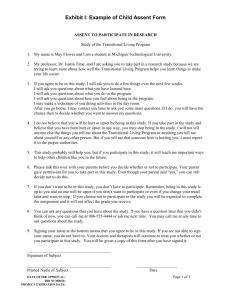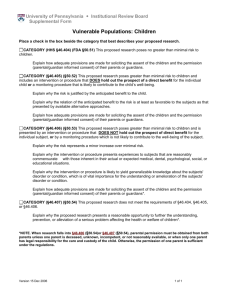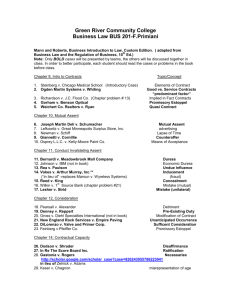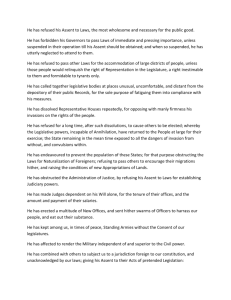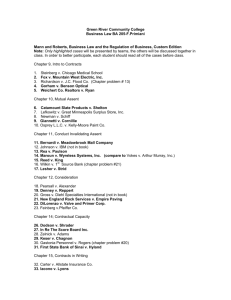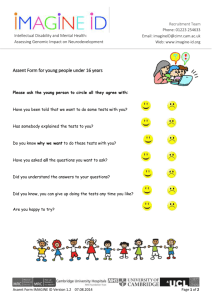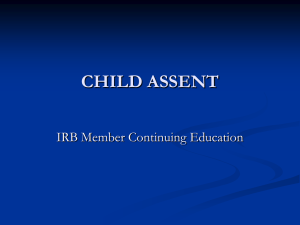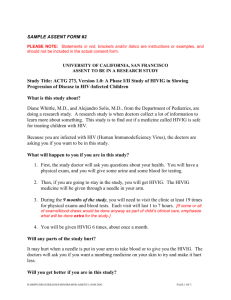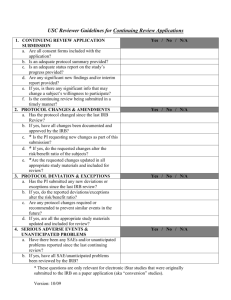Determining the Need for Assent
advertisement
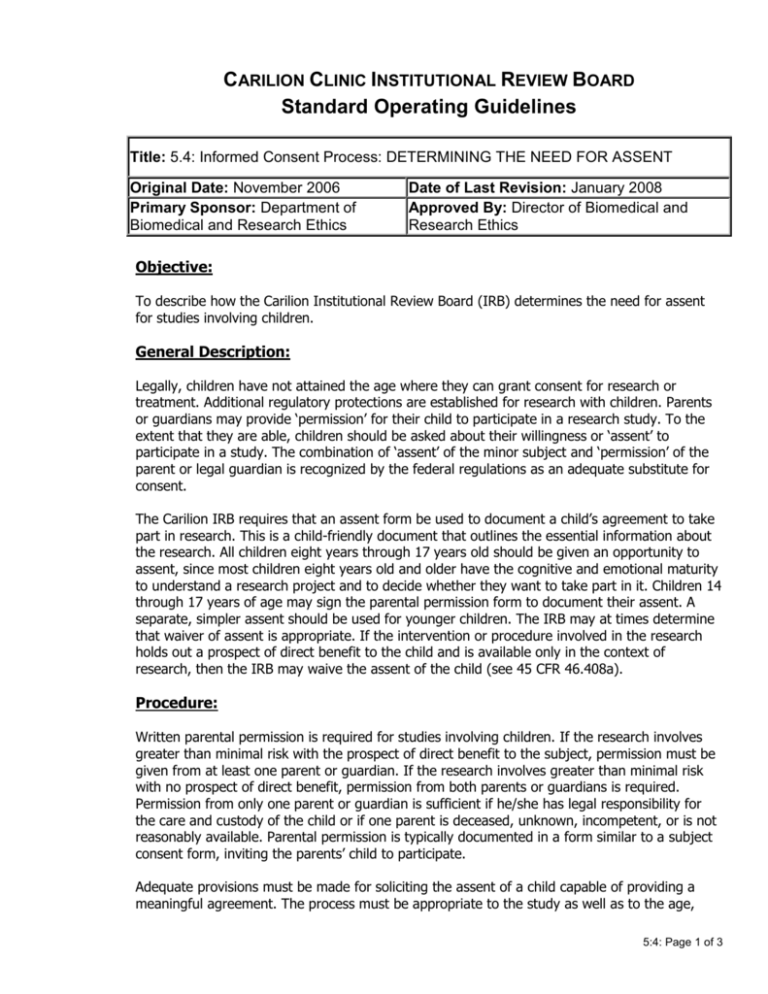
CARILION CLINIC INSTITUTIONAL REVIEW BOARD Standard Operating Guidelines Title: 5.4: Informed Consent Process: DETERMINING THE NEED FOR ASSENT Original Date: November 2006 Primary Sponsor: Department of Biomedical and Research Ethics Date of Last Revision: January 2008 Approved By: Director of Biomedical and Research Ethics Objective: To describe how the Carilion Institutional Review Board (IRB) determines the need for assent for studies involving children. General Description: Legally, children have not attained the age where they can grant consent for research or treatment. Additional regulatory protections are established for research with children. Parents or guardians may provide ‘permission’ for their child to participate in a research study. To the extent that they are able, children should be asked about their willingness or ‘assent’ to participate in a study. The combination of ‘assent’ of the minor subject and ‘permission’ of the parent or legal guardian is recognized by the federal regulations as an adequate substitute for consent. The Carilion IRB requires that an assent form be used to document a child’s agreement to take part in research. This is a child-friendly document that outlines the essential information about the research. All children eight years through 17 years old should be given an opportunity to assent, since most children eight years old and older have the cognitive and emotional maturity to understand a research project and to decide whether they want to take part in it. Children 14 through 17 years of age may sign the parental permission form to document their assent. A separate, simpler assent should be used for younger children. The IRB may at times determine that waiver of assent is appropriate. If the intervention or procedure involved in the research holds out a prospect of direct benefit to the child and is available only in the context of research, then the IRB may waive the assent of the child (see 45 CFR 46.408a). Procedure: Written parental permission is required for studies involving children. If the research involves greater than minimal risk with the prospect of direct benefit to the subject, permission must be given from at least one parent or guardian. If the research involves greater than minimal risk with no prospect of direct benefit, permission from both parents or guardians is required. Permission from only one parent or guardian is sufficient if he/she has legal responsibility for the care and custody of the child or if one parent is deceased, unknown, incompetent, or is not reasonably available. Parental permission is typically documented in a form similar to a subject consent form, inviting the parents’ child to participate. Adequate provisions must be made for soliciting the assent of a child capable of providing a meaningful agreement. The process must be appropriate to the study as well as to the age, 5:4: Page 1 of 3 maturity, and psychological state of the child. This judgment may be made for all children intended to be involved in a particular protocol, or for each child, as deemed appropriate by the IRB. When the IRB determines that assent is required, it shall also determine whether and how assent must be documented. The child’s agreement is documented with an “assent form,” a child-friendly document that outlines the essential information about the research. The document should be limited to one page if possible. All children ages 8 through 17 years old should be given an opportunity to assent, since most children in this age group have the cognitive and emotional maturity to understand a research project and to decide whether they want to participate in it. It is important to note that failure to object to participate as a research subject cannot be construed as assent. Some children under the age of 8 may also be capable of granting and withholding assent, and the IRB asks researchers to be sensitive to the needs of these children on an individual basis. Researchers should draft a form that is age-appropriate and study-specific, taking into account the typical child’s experience and level of understanding, and composing a document that treats the child respectfully and conveys the essential information about the study. There are times when the IRB may determine that a waiver of assent is appropriate. If the capability of some or all of the children is so limited that they cannot reasonably be consulted, a waiver of assent may be granted. If the intervention or procedure involved in the research holds out a prospect of direct benefit that is important to the health or well-being of the children and is only available in the context of the research, assent is not a necessary condition for proceeding with the research. Even when the IRB determines that the subjects may be capable of assenting, the IRB may still waive the assent requirement under circumstances in which consent may be waived in accord with CFR 46.116 of Subpart A. Below are examples to assist in determining what level of risk, and, therefore, what type of parental permission/assent is necessary. No Greater Than Minimal Risk This type of research may be performed if the IRB finds that the research presents no greater than minimal risk (defined as the probability that magnitude of harm or discomfort are not greater than those ordinarily encountered in daily life or during the performance of routine physical or psychological tests). This type of research requires the assent of the child and permission of at least one parent or guardian. Greater Than Minimal Risk but Presenting the Prospect of Direct Benefit This type of research may be performed if the IRB finds that: The anticipated benefit justifies the risk to the subject; and The anticipated benefit is at least as favorable as that of alternative approaches This type of research requires the assent of the child and permission of at least one parent or guardian. Greater Than Minimal Risk and No Prospect of Direct Benefit 5:4: Page 2 of 3 This type of research may be performed if the IRB finds that: There is only a minor increase over minimal risk The intervention or procedure is likely to yield generalizable knowledge about the child’s disorder or condition which is of vital importance for the understanding or amelioration of the subject’s disorder or condition; and The intervention or procedure presents experiences to the child that are reasonably commensurate with those inherent in the child’s actual or expected medical, dental, psychological, social or educational situations This type of research requires the assent of the child and permission of both parents or guardians. Any Other Research Any research that does not fit into the above categories may be performed if: The IRB finds that the research presents a reasonable opportunity to further the understanding, prevention, or alleviation of a serious problem affecting the health or welfare of children; or The Health and Human Services (HHS) Secretary approves, after consultation with a panel of experts in pertinent disciplines (e.g., science, medicine, education, ethics, law) and following publication in the Federal Register and public comment and requires the assent of the child and permission of both parents/guardian(s) Under very special circumstances, the IRB may waive the requirement for parental consent. Waivers can only be granted for conditions or for a subject population for which parental or guardian permission is not a reasonable requirement to protect the subjects (e.g. neglected or abused children), if an appropriate mechanism for protecting the child is provided, and if the waiver is not inconsistent with federal, state, or local law. 5:4: Page 3 of 3
